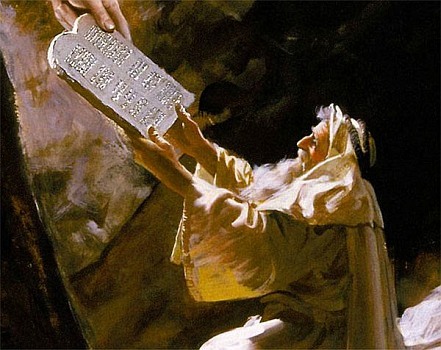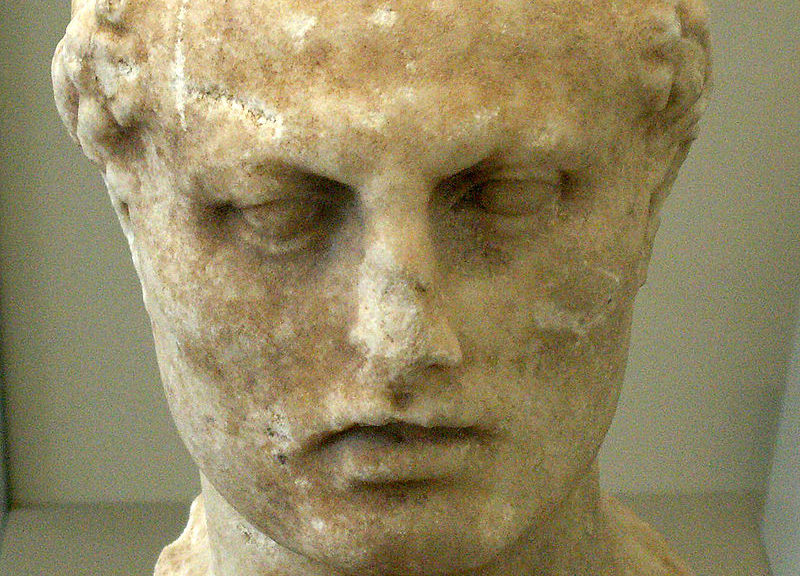Critics claim the writer of the Book of Daniel was a fraud who really lived in t
he 160’s BCE, rather than Daniel himself, who wrote the book in t
he 530’s BCE. Could it possibly be true that Daniel accurately predicted Antiochus IV Epiphan
es 350 years in advance?
“And now I shall tell you the truth about these things”—Daniel 11:1 NJB
“The vision of the evenings and the mornings which has been revealed is true”—Daniel 8:26 NJB
Other articles on this site have provided documented evidence that the Book of Daniel was written in the 500’s BCE, and 350 years in advance, accurately predicted details of the exploits of Syrian King Antiochus IV Epiphanes, who was the Biblical “king of the =&0=& for about 12 years. The Greek philosopher Porphyry (233-304 CE) wrote a work in fifteen volumes he called Against the Christians, in which he attempted to prove that Jesus Christ was only an outstanding philosopher, but not who he said he was. In fact, Porphyry railed against Jesus’ reference to “the prophet Daniel” (Matthew 24:15 NIV) as being the writer of the book bearing his name. His reasoning was based, at least, in part, on the fact that Daniel 8:9-14,23-25; 11:21-39 so accurately predicted Antiochus IV Epiphanes, that he could not accept it as prophecy written in advance. The “predictions” were just too accurate for him to accept. He claimed that a fraud pretending to write prophecy in advance had to have written Daniel, because the events described could not have been so accurately predicted.
This article will discuss exactly what some of the scriptures in Daniel 11 foretold about Antiochus IV Epiphanes, and how they were fulfilled.
“The next to come to power will be a despicable man who is not in line for royal succession. He will slip in when least expected and take over the kingdom by =&1=&
This verse accurately foretold the coming to power of Antiochus IV Epiphanes in 175 BCE. He’s also the “small horn” of 8:9-14, 23-25, and is historically described in detail in 1 Maccabees 1:7-6:16; 2 Maccabees 1:1-10:5; 4 Maccabees 4:15-18:5. Why was Antiochus foretold to be despicable? He was not a legitimate successor of his brother Selucus IV, since Selucus IV had a son. He was called despicable because he would usurp the kingship through his use of “flattery and intrigue”, thus currying the favor of Rome, and for his notorious acts as king. His brother, Seleucus IV had a son, Demetrius, who was very young , and held in Rome as a hostage at the time. Antiochus therefore seized the throne for himself with the help of King Eumenes II of Pergamon., proclaiming himself co-regent with another son of Seleucus, an infant named Antiochus (whom he murdered a few years later). The prediction called him a “despised,” or “despicable,” person because of his hatred of the Jewish people, his attempt to destroy Jerusalem, his desecration of the Temple and his megalomania displayed in calling himself Epiphanes (‘Manifest One; Illustrious One’). People of that time also called him Epimanes (‘Madman’).
“Before him great armies will be swept away, including a covenant prince”—Daniel 11:22 NLT
Daniel accurately these details of the actions of Antiochus IV Epiphanes. The “great armies” refer to the way all opposition against Antiochus IV will be broken. Despite Ptolemy VI Philometor (181 BCE–146 BCE) attacking with a flood of forces, Antiochus IV would be able to defeat them, and also depose the covenant prince, the Jewish high priest Onias III, in 175 BCE and replace him with his brother Jason (2 Maccabees 4:7-10). In 171 BCE, Onias was murdered by Menelaus, through manipulation of one Antiochus IV’s nobles, Andronicus (2 Maccabees 4: 32-43). Menelaus then became high priest (171–162 BCE), until his execution (2 Maccabees 13:3-8). Menelaus supported Antiochus IV’s program of hellenization.
“With deceitful promises, he will make various alliances. He will become strong despite having only a handful of followers (quoted from NLT). During a time of peace, he will come into the richest parts of the province and do what his fathers and predecessors never did (quoted from HCSB)”—Daniel 11:23,24
Antiochus IV would increase in power by sharing the wealth of his conquests, lavishing plunder, loot, and wealth on his supporters. He introduced Greek religion into Judea, helped by lawless followers who supported his policies (1 Maccabees 1:11-15). Antiochus IV seized the riches of the Temple, took large tributes from Jerusalem, and stationed troops there (1 Maccabees 1:29-40).
“Then he will stir up his courage and raise a great army against the king of the south. the king of the south will go to battles with =&2=&
These verses refer back to the first campaign of Antiochus against Ptolemy VI Philometer of Egypt (vs 22), predicting that not only would the power of Antiochus defeat Ptolemy VI, but also that plots “against him” would cause his army to be swept away. Antiochus IV attacked Egypt twice between 170 and 168 BCE (1 Maccabees 1:16-19). The guardians of Ptolemy VI Philometer demanded the return of Coele-Syria in 170 BCE, but Antiochus launched a preemptive strike against Egypt, capturing all but Alexandria. In this first campaign of Antiochus IV against Ptolemy Philometer of Egypt (son of Antiochus’ sister Cleopatra, and Ptolemy V), Ptolemy was mislead by his advisers, and was defeated, and captured by Antiochus, at Pelusium, on the border with Egypt. Antiochus, pretended friendship, but plundered Egypt. On the way back, Antiochus IV Epiphanes savagely mistreated the Jews (verse 28), as Daniel predicted.
“The two kings, with their hearts bent on evil, will sit at the same table and lie to each other, but because an end will still come at the appointed time. The king of the North will return to his own country with great wealth, but his heart will be set against the holy covenant. He will take action against it and then return to his own country”—Daniel 11:27,28 NIV
After the defeat of Ptolemy VI, Ptolemy VII took control of Egypt. Then, “the two (other) kings”, Antiochus IV and Ptolemy VI, who was living in Antiochus’ custody, would meet, ‘speaking lies at the same table’, to plot Ptolemy VI’s restoration to the throne. To avoid alarming Rome, Antiochus allowed Ptolemy VI to continue ruling as a puppet king. After initial limited success, they would eventually fail. Then “the king of the North”, Antiochus IV, having plundered Egypt, would return to his land, but ‘with his heart set against the holy covenant’. On the way home to Syrian Antioch from Egypt, in response to intrigues in Jerusalem against his supporters, he would turn his hatred toward and attack Israel. This would result in killing 80,000 Jewish men, women, and children, and plundering Jerusalem and the holy temple’ (170-169 BCE), and enslaving many others (1 Maccabees 1:20-42; 2 Maccabees 5:1-23). His arrogance was unbounded (1 Maccabees 1:24,25).
We can learn even from the bad example of these ‘two treacherous kings’ (vs 27). Treachery and deceit are a power broker’s way to position himself over someone else. When two power brokers try to gain the upper hand, it is a mutually weakening and self-destructive process. It is also futile because God ultimately holds all power in his hands.
“At the appointed time he will invade the South again, but this time the outcome will be different from what it was before. Ships of the western coastlands will oppose him, and he will lose heart. Then he will turn back and vent his fury against the holy covenant. He will return and and show favor to the those who forsake the holy covenant”—Daniel 11:29,30 NIV
Upon Antiochus’ withdrawal, the city of Alexandria chose a new king, one of Ptolemy’s brothers, named Ptolemy VIII Euergetes. The Ptolemy brothers agree to rule Egypt jointly instead of fighting a civil war. In 168 BCE, Antiochus IV again invaded “the South”, Egypt. However, this second campaign against Egypt would end in ignominy. “Ships of the western coastlands” (“ships of Kittim”, Numbers 24:24), would come from the west, past Cyprus. They were the Romans fleet vessels under the command of Roman consul Gaius Popilius Laenas, who would arrive at Alexandria before Antiochus reached it. He would inform Antiochus of the Roman senate’s order to withdraw, forcing Antiochus to give his answer right then —whether he would continue to fight. The general drew a circle in the sand, forced Antiochus to stand inside it, before he was allowed to exit the circle, he had to decide whether return home or prepare for war with Rome, which would put Antiochus in a state of war with the Roman republic. The other decision would force Antiochus to retreat from Egypt, withdrawing in shameful humiliation— which is what he did, since he feared the Roman fleet, “ships of the western coastlands”, “ships of Kittim” (compare Numbers 24:24). These “ships” had sailed from the west past Kittim (Cyprus). On the way home, he vented his anger and humiliation on the Jews the people of “the holy covenant”, determined to exterminate the Jewish religion, attacking Jerusalem in 168 BCE.
“His armed forces will rise up to desecrate the temple fortress and will abolish the daily sacrifice. Then they will set up the abomination that causes =&3=&
Antiochus would once again attack Israel, while returning to Syria. He captured and plundered Jerusalem in 167 BCE, desecrated the Temple, and stopped the Jews’ “daily sacrifice” at the altar (“take over the Temple, put a stop to the daily sacrifices”–NLT), and made all Mosaic Law practices illegal . He rewarded (“flatter and win over”–NLT) those who would come over to him, “those who have violated the holy covenant”. The Temple was desecrated when he sacrificed pigs on an altar erected in honor of the pagan Greek god Zeus Olympius. (1 Maccabees 1:54,59; 2 Maccabees 6:2). According to Jewish Law, pigs were unclean and were not to be touched or eaten. (Leviticus 11:7,8; Daniel 8:9-14, 23-26), and was considered to be one of the worst insults against the Jews. This prefigured a similar abomination that Jesus predicted would be erected in the future (Matthew 24:15; Luke 21:20).
Antiochus harassed and killed whoever refused to ‘ violate the covenant’ (1 Maccabees 1:43-61). “The people who know their God”, who would resist the Hellenizers and would be ready to die for their faith, were foretold to “firmly resist him”, as expressed in the Maccabean revolt (1 Maccabees 1:62-64).
=&4=&





